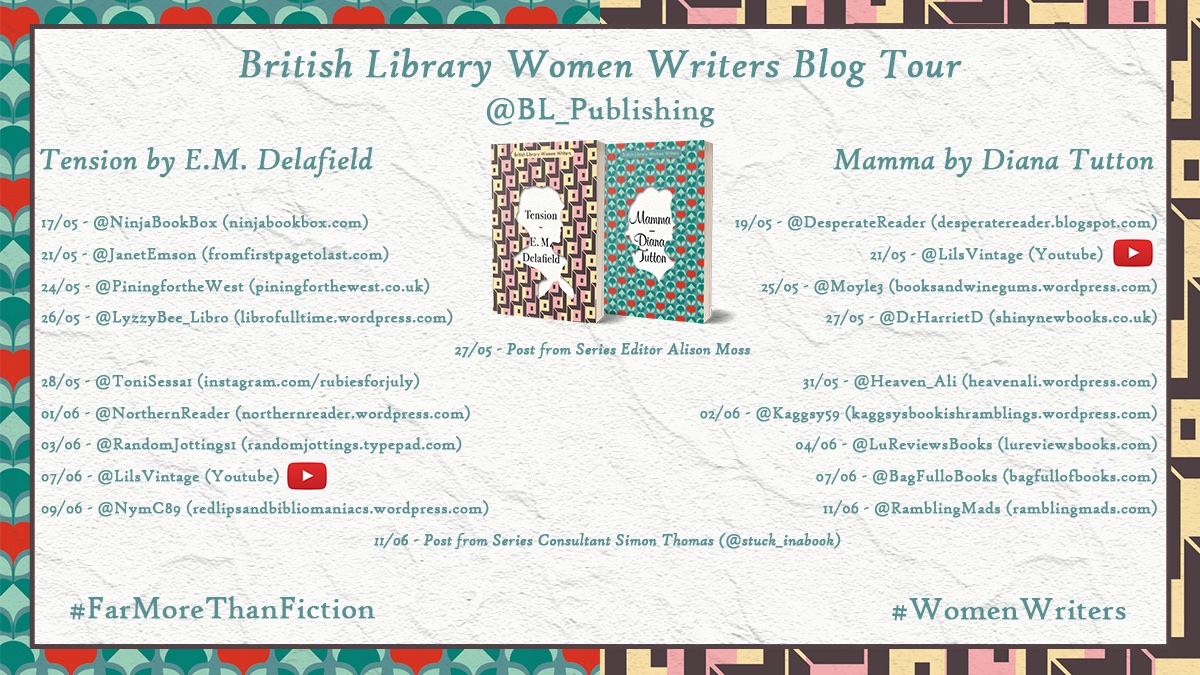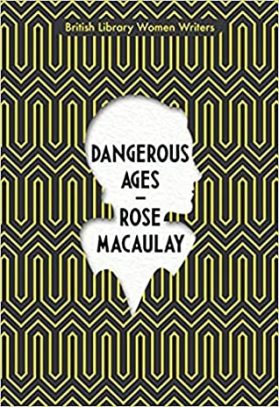 If you click on the tag above, you’ll be able to see my posts about all the British Library Women Writers books as they come out – or, more often, some time after they come out. But Tension by E.M. Delafield only came out a couple of weeks ago – and I’m delighted, as Delafield was definitely one of the authors I was really hoping would get onto the list. But when she wrote so many books, so many of which aren’t in print (or are only POD and ebook), how would I choose?
If you click on the tag above, you’ll be able to see my posts about all the British Library Women Writers books as they come out – or, more often, some time after they come out. But Tension by E.M. Delafield only came out a couple of weeks ago – and I’m delighted, as Delafield was definitely one of the authors I was really hoping would get onto the list. But when she wrote so many books, so many of which aren’t in print (or are only POD and ebook), how would I choose?
I’m hoping this won’t be the last EMD title in the series, but I chose Tension for the simple reason that I think it’s one of her best – and I’ve read about 30 of her books now. Apparently I read it in 2004, but I didn’t remember anything about it and loved my re-read for the 1920 Club about a year ago. I’m recycling much of that review here.
The main characters are Lady Rossiter and Sir Julian Rossiter, and when Delafield created them I suspect she had half an eye on Mr and Mrs Bennet from Pride and Prejudice. They have very little fondness for each other, though Sir Julian usually restricts himself to silently laughing at Lady Rossiter’s nonsensical sayings and gossip. Where she differs from Mrs Bennet is that Lady R is also hypocritical and a little cruel – though she would always see it as doing her duty. That is one of the main tensions of Tension.
But all starts off very amusingly – here’s the opening of the novel:
“Auntie Iris has written a book!”
“A book!” echoed both auditors of the announcement, in keys varying between astonishment and dismay.
“Yes, and it’s going to be published, and put into a blue cover, and sold, and Auntie Iris is going to make heaps and heaps of money!”
“What is it to be called?” said Lady Rossiter rather gloomily, fixing an apprehensive eye on the exuberant niece of the authoress.
“It’s called ‘Why, Ben!’ and it’s a Story of the Sexes,” glibly quoted the young lady, unaware of the shock inflicted by this brazen announcement, delivered at the top of her squeaky, nine-year-old voice.
Could there be a better fake title than Why, Ben! – I love it, and all the comedy around how horrified everyone is by the idea of this book is glorious. Delafield might also have Austen in mind with her style in this novel – she does lots of sentences with the balance and irony of an Austen sentence, laughing at everyone involved and never saying quite everything – leaving the reader to fill in the gaps and thus feel on the side of the author.
The children (whom the Rossiters unite in loathing, though Lady R would not admit it openly) are neighbours, and the offspring of harassed, jovial Mark. Their mother is (whisper it) a ‘dypsomaniac’, shut away but very much not dead. And that is why Lady Rossiter takes an officious concern when a young woman moves to the area and starts working with Mark – because, surely, it is the same Miss Marchrose who once broke off an engagement when her fiance became disabled…
Delafield often enjoys poking fun at people who ‘Don’t want to gossip, but…’ – and sometimes she shows the dark side of it too. Tension is always an extremely funny book, particularly if you like dry, character-based, and dialogue-heavy comedy (which I definitely do), but it gets darker as it goes on. Lady Rossiter is ruthlessly determined to ruin Miss Marchrose, all in the name of protecting those around her and not wanting to gossip. She never does anything outright. She just quietly and subtly makes the situation impossible for Miss Marchrose. And Delafield is so clever at not making Lady Rossiter a deceitful character – she genuinely does believe she is doing what is right, and has an answer for every exasperated accusation Sir Julian makes. Which isn’t that many, because he follows the path of least resistance.
Delafield is brilliant when she unites comedy and tragedy, and I think Tension is one of her best books. It’s certainly stylised, but it’s a style I loved.
And I think it makes such a great addition to the Women Writers series because it is so centred on how rumours and reputation devastatingly affect women – whether the rumours are founded or not – while men are scarcely impacted. By making a woman the nemesis too, Delafield resists a black and white reading of who hurts whom – though arguably Lady Rossiter is as much a product of a patriarchal society as anybody else.
My sweet spot is books that are funny AND poignant, and this is up there with earlier British Library Women Writers titles Father by Elizabeth von Arnim and Dangerous Ages by Rose Macaulay in doing just that.



 If you click on the tag above, you’ll be able to see my posts about all the British Library Women Writers books as they come out – or, more often, some time after they come out. But Tension by E.M. Delafield only came out a couple of weeks ago – and I’m delighted, as Delafield was definitely one of the authors I was really hoping would get onto the list. But when she wrote so many books, so many of which aren’t in print (or are only POD and ebook), how would I choose?
If you click on the tag above, you’ll be able to see my posts about all the British Library Women Writers books as they come out – or, more often, some time after they come out. But Tension by E.M. Delafield only came out a couple of weeks ago – and I’m delighted, as Delafield was definitely one of the authors I was really hoping would get onto the list. But when she wrote so many books, so many of which aren’t in print (or are only POD and ebook), how would I choose?


 I intend to write about each of the British Library Women Writers titles as they come out, though I’m already a bit behind because the brilliant Father by Elizabeth von Arnim is also out now!
I intend to write about each of the British Library Women Writers titles as they come out, though I’m already a bit behind because the brilliant Father by Elizabeth von Arnim is also out now!